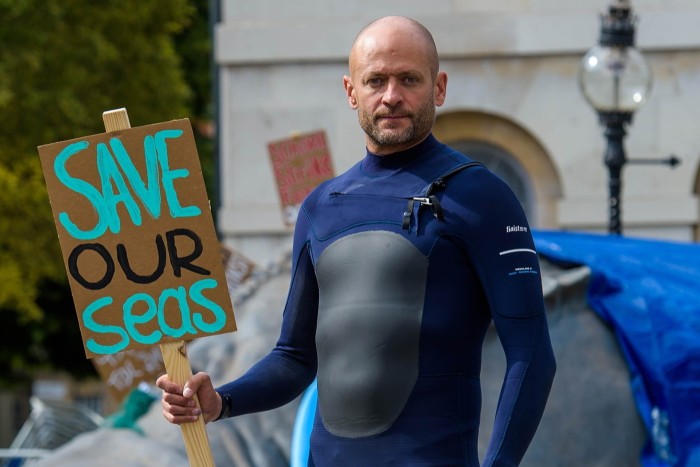Unlock the Editor’s Digest for free
Roula Khalaf, Editor of the FT, selects her favourite stories in this weekly newsletter.
The UK government is fighting a fresh bid by environmentalists to quash North Sea oil and gas licences in the latest test of Labour’s attempts to balance net zero goals and business complaints about regulation.
At the High Court on Wednesday, campaign group Oceana challenged the process by which licences were granted last May to allow companies, including TotalEnergies, Ineos and Perenco, to explore for oil and gas.
The decisions were made under the previous Conservative government, but Labour, which swept to power in July, is defending the licences.
The government is consulting on the future of North Sea energy, including on how to deliver Labour’s manifesto commitments not to issue licences to explore new fields while not revoking existing licences.
Judge Tim Mould KC said in court on Wednesday that while the case dealt with climate-related matters of “enormous political controversy”, he would focus only on “legal process” behind the licensing decisions.
Hugo Tagholm, executive director of Oceana, said he hoped the case would help push Sir Keir Starmer’s government to drop its support for existing licences.
Oceana is arguing that the government’s approval of oil and gas exploration risk assessments that underpinned last year’s round of licensing in the North Sea was unlawful, as these did not fully consider the potential climate and environmental impact on marine protected areas.

Shielding marine environments from oil spills and from the ocean warming and acidification that go hand in hand with climate change should not be seen as “part of a culture war” or “green versus growth”, Tagholm said.
He added: “This is protecting nature to protect future prosperity, future industry.”
The case centres on dozens of licences issued by the North Sea Transition Authority (NSTA) last May where the extraction could affect marine protected areas. An assessment for each licence was carried out by the Offshore Petroleum Regulator for Environment and Decommissioning (OPRED).
Oceana’s claim builds on a Supreme Court decision last June in a case known as Finch, which said regulators must consider how burning oil and gas could accelerate climate change when they draw up environmental impact assessments for drilling sites.
The campaign group argues that the Finch standard should also apply to assessments that are drawn up before licences are awarded in the UK’s marine protected areas.
Oceana alleges the Department for Energy Security and Net Zero failed to consider advice fully from the statutory expert it is meant to consult when preparing assessments.
Oceana’s case is based on a “misunderstanding” of the licensing process and a “misapplication” of the Finch standard, lawyers outlined in a summary of Desnz’s position, seen by the Financial Times. This is because exploration licences do not necessarily lead to oil and gas production, to greenhouse gas emissions or to localised warming, it said.
It was lawful to defer more detailed climate and environmental assessments to a later stage, it added, and called for the case to be dismissed.
A letter by the Joint Nature Conservation Committee, sent last May and seen by the FT, warned that it could not rule out the risk that exploration would harm the marine environment, including because burning the oil and gas would contribute to climate change.
Desnz and NSTA said they could not comment on ongoing legal proceedings. A person close to NSTA said licences were only awarded once OPRED had evaluated “any potential adverse effects” on protected areas.
Perenco said: “As a responsible operator, we comply with all relevant environmental regulations.” Ineos and TotalEnergies did not respond to requests for comment.
Labour’s stance in the Oceana case contrasts with its decision last year not to challenge efforts by environmental groups to block the development of the Rosebank and Jackdaw oilfields in the North Sea.
Scotland’s top civil court ruled this year that consent for the projects had been granted unlawfully under the Tories.
Starmer, who has in recent months increasingly sought to present his government as pro-business, has signalled Labour will probably give approval again in response to new applications for those fields.
Climate Capital

Where climate change meets business, markets and politics. Explore the FT’s coverage here.
Are you curious about the FT’s environmental sustainability commitments? Find out more about our science-based targets here












